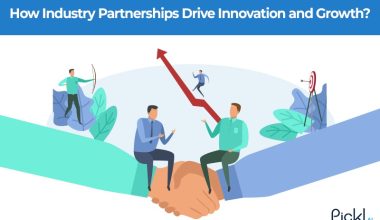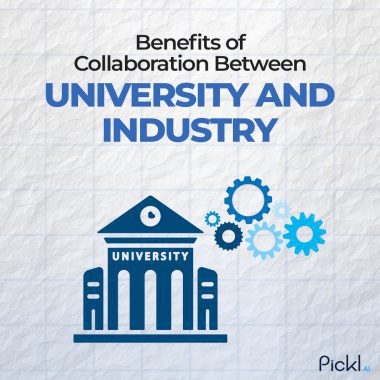Summary: This blog explores how new university-industry partnerships, especially through platforms like Pickl.AI, are crucial for a future-ready workforce. It highlights benefits like enhanced employability and innovation, showcasing Pickl.AI’s practical methodology, including hackathons and curriculum upgrades, to address the skill gap in India and globally.
Introduction
The global landscape is undergoing an unprecedented transformation, driven by rapid technological advancements and evolving market demands. In this dynamic environment, the traditional model of education often struggles to keep pace, leading to a significant skill gap between graduates and industry requirements.
A staggering 51.25% of Indian graduates are considered unemployable due to a lack of relevant skills, according to a recent Aspiring Minds report. Globally, the World Economic Forum estimates that over half of all employees will require significant reskilling by 2025.
These statistics paint a clear picture: a robust and responsive mechanism is crucial to bridge this chasm. This is where industry academia collaboration emerges not just as a buzzword, but as a critical imperative.
For decades, the concept of industry academia collaboration has been discussed, but often with limited tangible outcomes. Historically, these partnerships have been characterized by sporadic interactions. However a new wave of change is emerging, wherein innovative platforms and methodologies create a truly symbiotic relationship, fostering a future-ready workforce.
The Imperative of Industry Academia Collaboration in India
India, with its vast youth population and ambitious economic growth targets, stands to gain immensely from a more effective industry academia collaboration. The nation’s demographic dividend can only be realized if its graduates are equipped with the skills demanded by a rapidly digitizing economy.
While the government has launched initiatives like Skill India, the real transformation will come from grassroots efforts and structured partnerships between educational institutions and corporations.
The benefits of robust industry-academia collaboration in India are multifaceted:
- Enhanced Employability: Graduates equipped with practical, industry-relevant skills are more likely to secure meaningful employment, reducing unemployment rates and boosting economic productivity.
- Innovation and Research: Collaborative research projects can lead to groundbreaking innovations, addressing real-world challenges and fostering a culture of scientific inquiry.
- Curriculum Relevance: Direct input from industry ensures that academic curricula remain up-to-date and aligned with the latest technological advancements and market trends.
- Faculty Development: Industry exposure and training opportunities allow faculty members to enhance their expertise, bringing real-world perspectives into the classroom.
- Entrepreneurship and Start-up Ecosystem: Partnerships can foster an entrepreneurial mindset among students, encouraging them to develop innovative solutions and potentially launch their own ventures.
Pickl.AI: A Catalyst for Transformative Industry Academia Collaboration

In this evolving landscape, platforms like Pickl.AI are emerging as game-changers, offering a structured and practical approach to industry academia collaboration. Pickl.AI’s model focuses on bridging the skill gap through immersive, hands-on learning experiences, directly integrating industry expertise into academic ecosystems. It goes beyond theoretical knowledge, emphasizing applied skills that are immediately relevant in the professional world.
Hackathons and Ideathons
These intense, problem-solving events bring together students, faculty, and industry mentors to tackle real-world challenges. For instance, a hackathon organized by Pickl.AI in collaboration with a leading e-commerce company could challenge students to develop AI-powered solutions for personalized customer recommendations or optimize logistics. This not only hones their technical skills but also fosters teamwork, critical thinking, and innovation.
Faculty Development Programs (FDPs)
To ensure that educators are at the forefront of industry trends, Pickl.AI facilitates specialized FDPs. These programs train faculty members in emerging technologies like AI, machine learning, data science, and cloud computing, directly delivered by industry experts. This empowers faculty to integrate cutting-edge knowledge and practical case studies into their teaching.
Curriculum Upgrades and Co-creation
Pickl.AI actively works with universities to co-create and upgrade their curricula, ensuring alignment with industry demands. This involves identifying skill gaps, designing new modules, and integrating industry-relevant projects into existing courses. By leveraging Pickl.AI’s insights, academic institutions can develop programs that are not only academically rigorous but also highly practical and employer-centric.
Real-World Projects and Internships
Pickl.AI connects students with genuine industry projects, offering them invaluable hands-on experience. These projects are often sponsored by companies looking for innovative solutions or seeking to identify future talent.
Furthermore, Pickl.AI facilitates industry internships, allowing students to immerse themselves in a corporate environment, apply their theoretical knowledge, and develop essential professional skills.
Real-World Impact and Success Stories
The transformative power of platforms like Pickl.AI in driving effective industry academia collaboration is evident in numerous success stories:
Solving Industry Challenges
A prominent manufacturing company faced challenges in predicting equipment failures. Through a Pickl.AI-led industry academia collaboration, students from a local engineering college, guided by their faculty and industry mentors, developed a predictive maintenance model using machine learning. This solution not only saved the company significant maintenance costs but also provided the students with an unparalleled learning experience.
Bridging the Skill Gap in Data Science
Many universities struggled to provide students with the practical data science skills demanded by the industry. Pickl.AI partnered with several institutions, providing specialized bootcamps, workshops, and access to real-world datasets. As a result, graduates from these programs are now highly sought after by data analytics firms, showcasing the direct industry academia collaboration benefits.
Fostering Innovation in Healthcare Technology
In one notable industry-academia collaboration example, Pickl.AI facilitated a partnership between a medical technology startup and a university’s biomedical engineering department. Students worked on developing AI-powered diagnostic tools, contributing to cutting-edge research while gaining invaluable experience in a high-growth sector.
These examples underscore how a proactive, platform-driven approach to industry academia collaboration can move beyond mere rhetoric to deliver tangible results, benefiting students, institutions, and industries alike.
The Future of Industry Academia Collaboration
The future of education and workforce development hinges on the strength and efficacy of Industry Academia Collaboration. As technologies like Artificial Intelligence, Machine Learning, Blockchain, and the Internet of Things continue to reshape industries, the need for continuous skill upgrading will only intensify. Platforms like Pickl.AI are at the forefront of this evolution.
By fostering environments where students are exposed to real-world challenges, faculty are continuously upskilled, and curricula are dynamically updated, the model championed by Pickl.AI ensures that graduates are not just degree holders, but truly future-ready professionals.
This new model of industry academia collaboration is not just about producing employable graduates; it’s about building a robust ecosystem of innovation. The journey towards a more synergistic relationship between academia and industry has truly begun, and with platforms like Pickl.AI leading the charge, the future looks brighter than ever.
Frequently Asked Question
What are the primary industry academia collaboration benefits?
The primary benefits include enhanced student employability, access to cutting-edge research and innovation, relevant curriculum development, continuous faculty development, and the fostering of an entrepreneurial ecosystem.
How does industry academia collaboration in India address the skill gap?
In India, collaboration addresses the skill gap by providing students with practical, industry-relevant skills through internships, real-world projects, hackathons, and updated curricula, making them more prepared for the demands of the job market.
Can you provide industry-academia collaboration examples beyond just technology?
Absolutely. While technology is a prominent area, collaborations extend to fields like healthcare (e.g., medical device development, clinical trials), agriculture (e.g., smart farming solutions, crop yield optimization), sustainable energy (e.g., renewable energy research, efficiency studies), and even design and arts (e.g., product design, digital media projects for companies).




